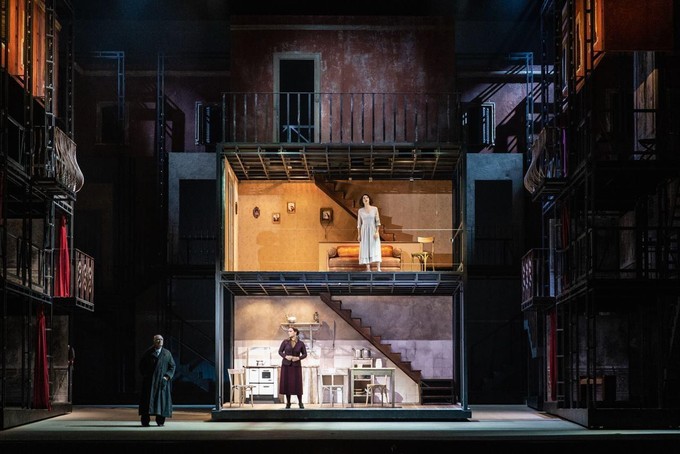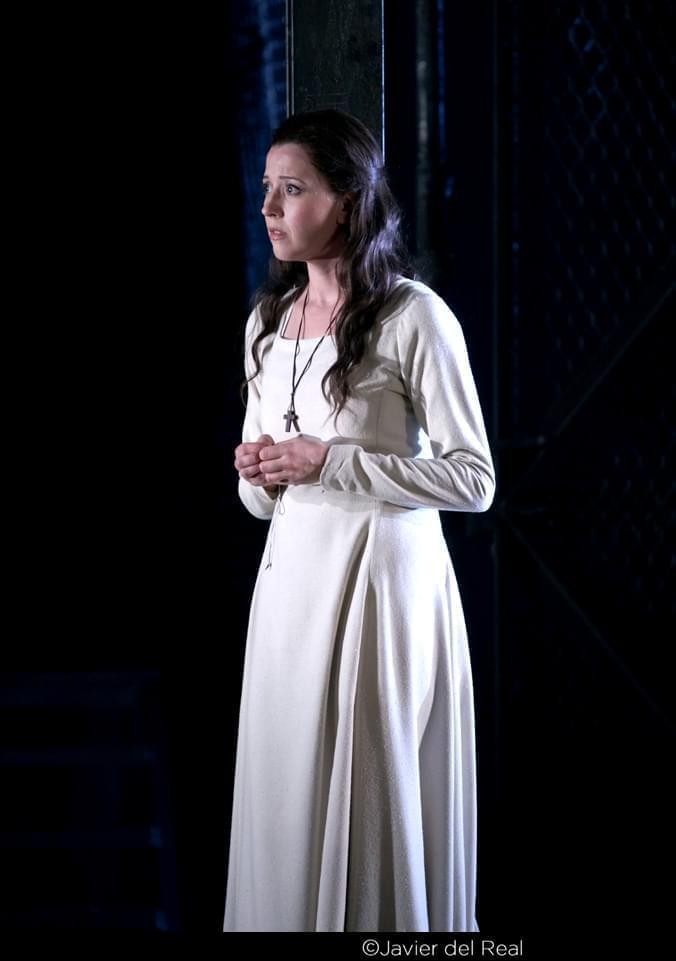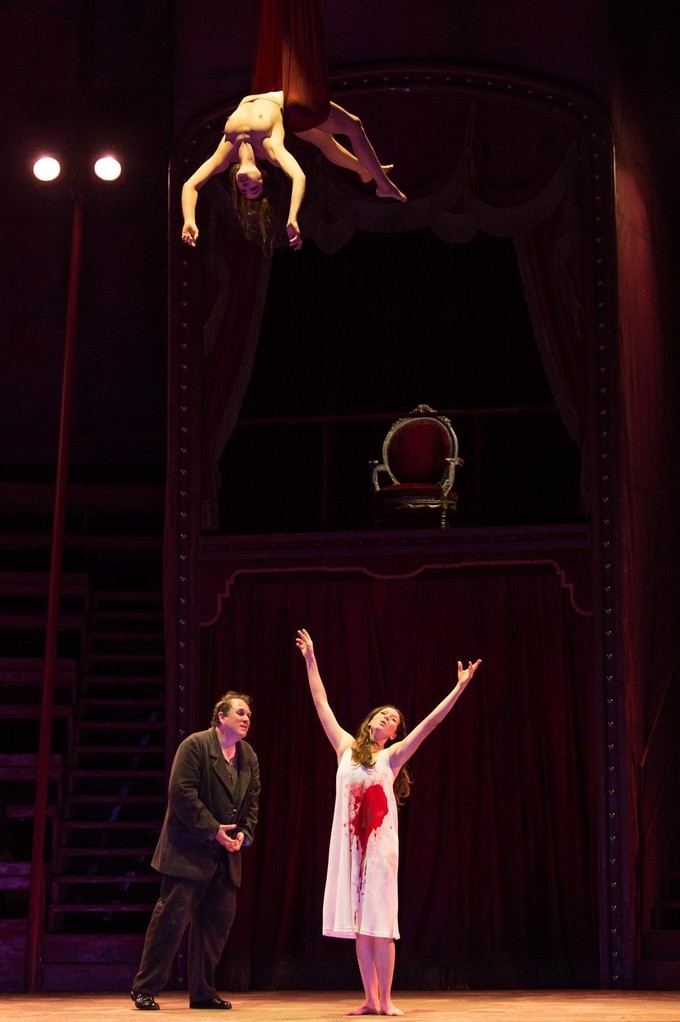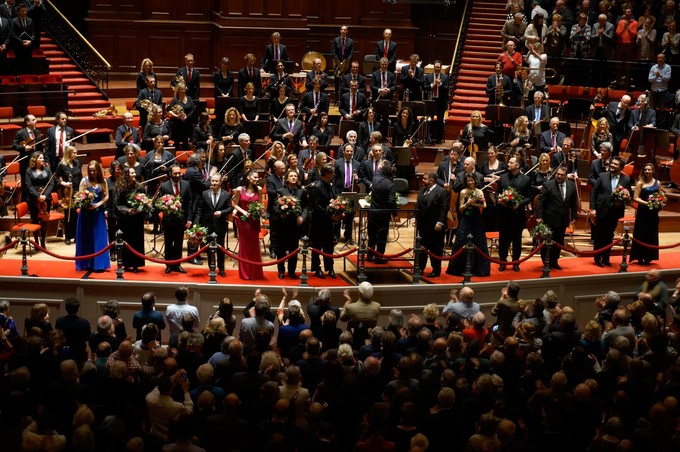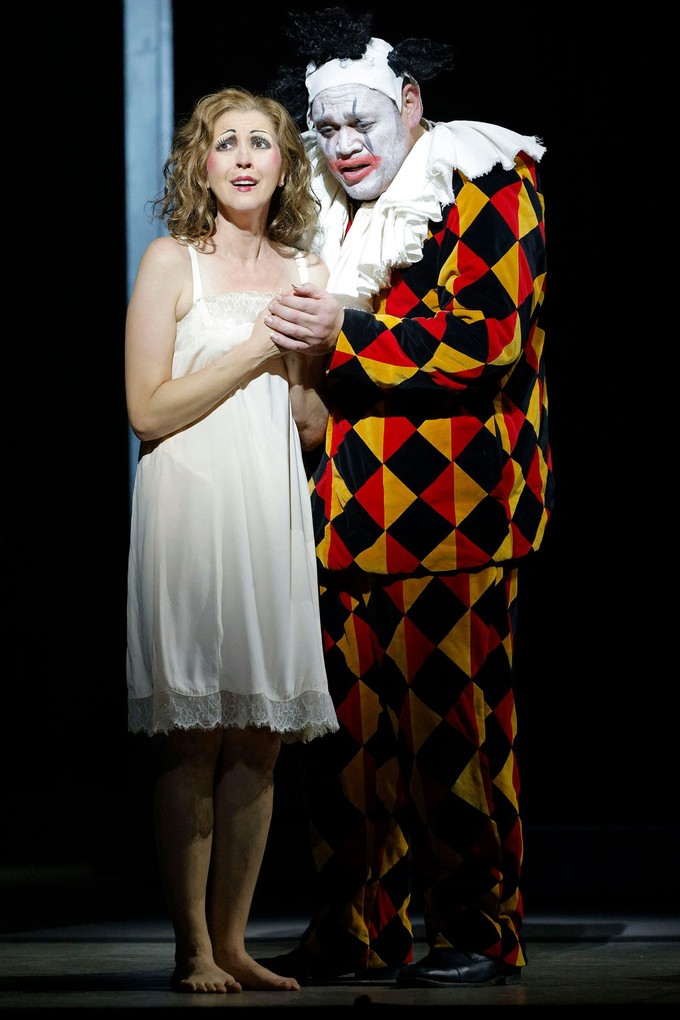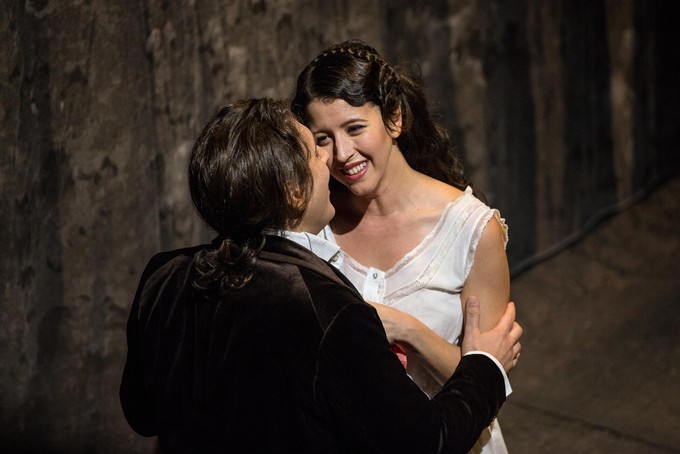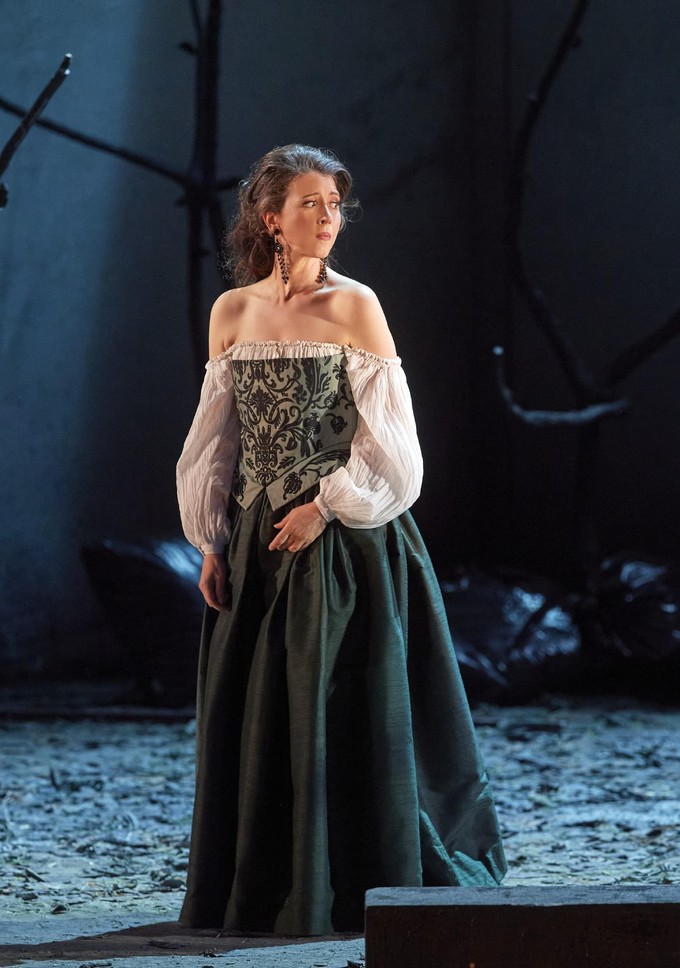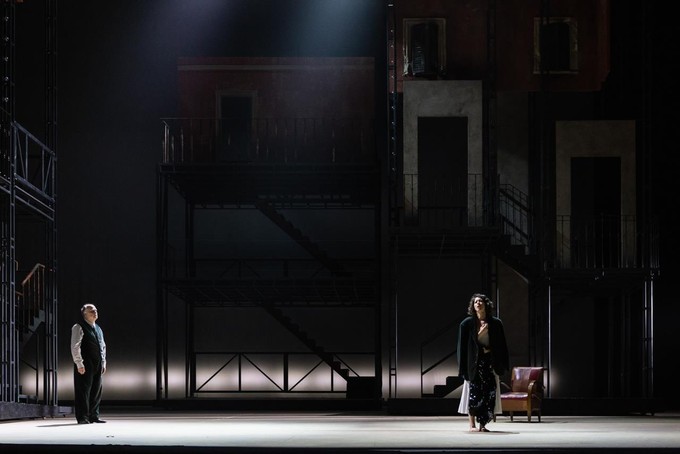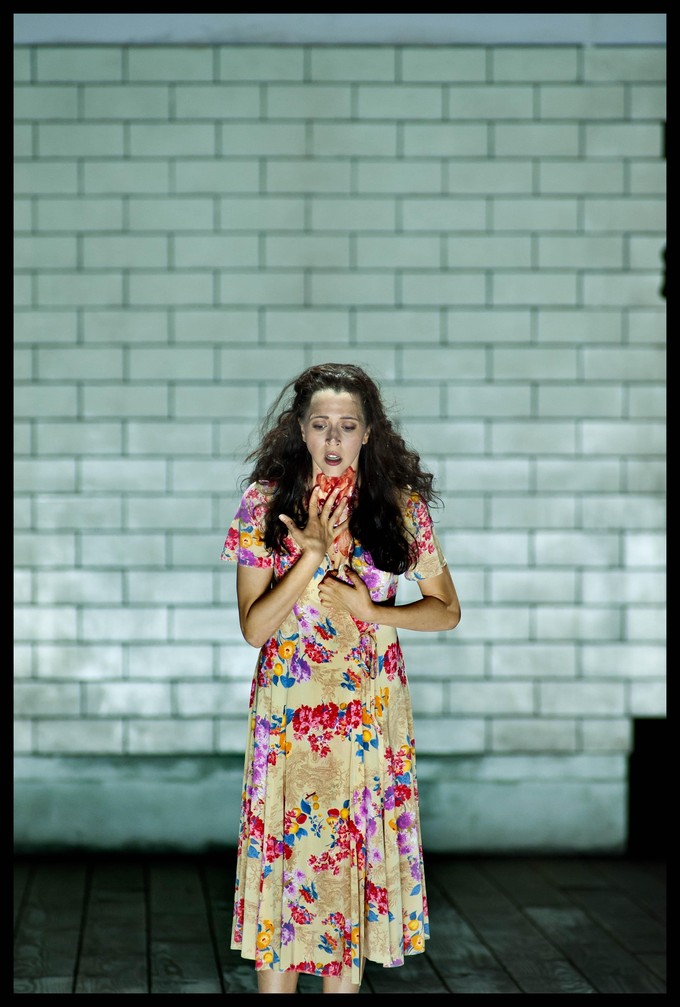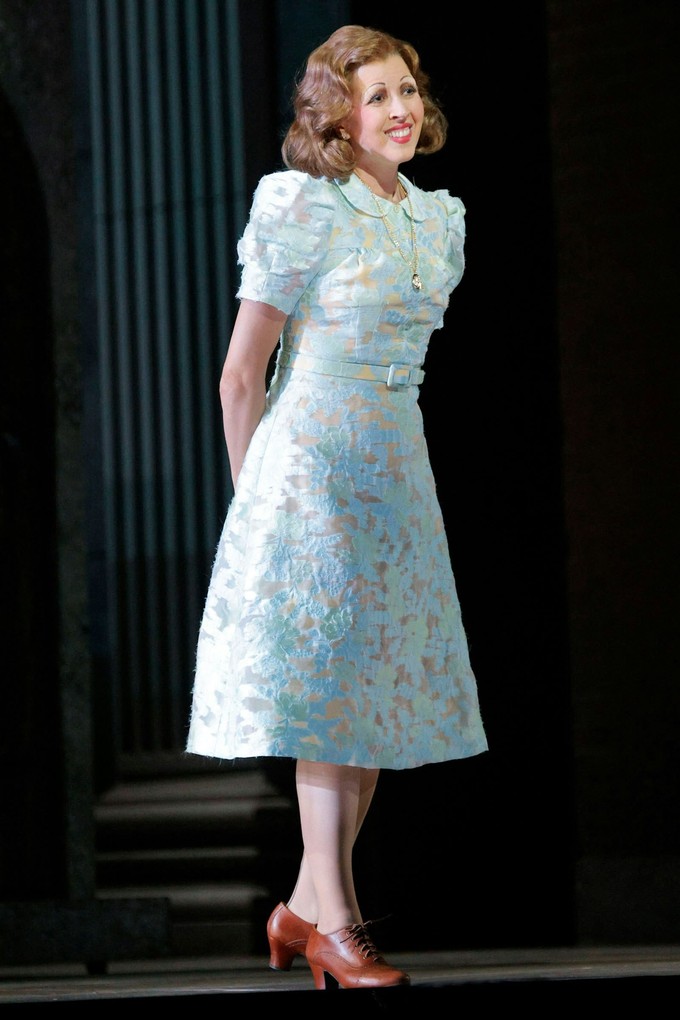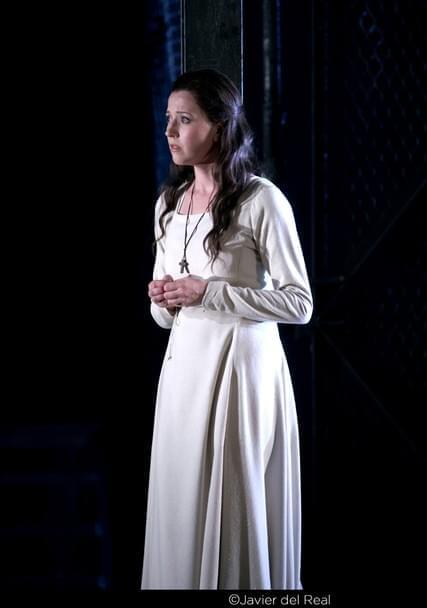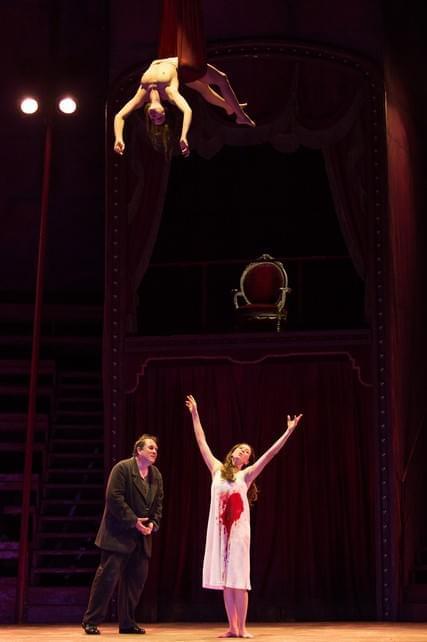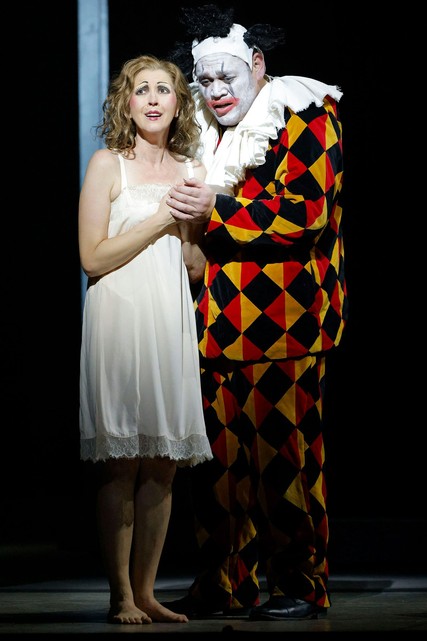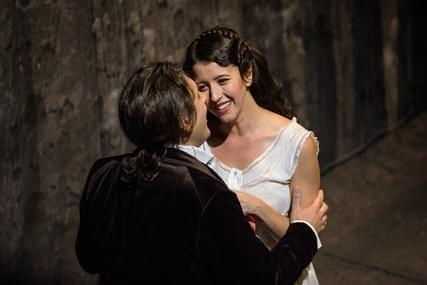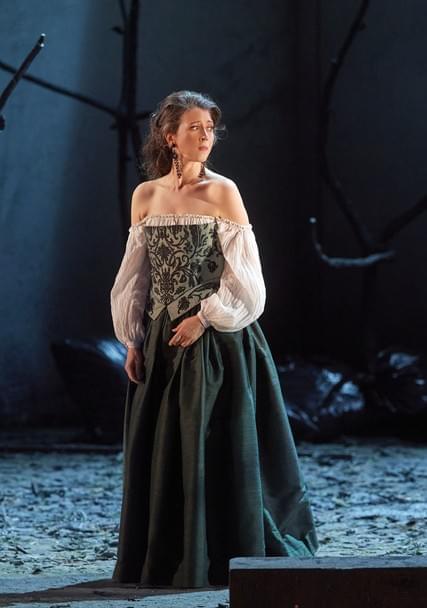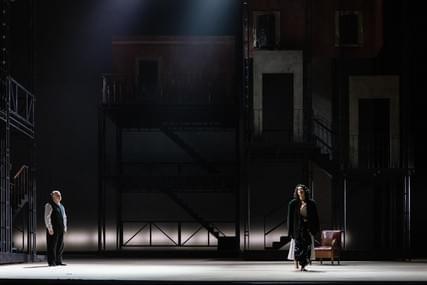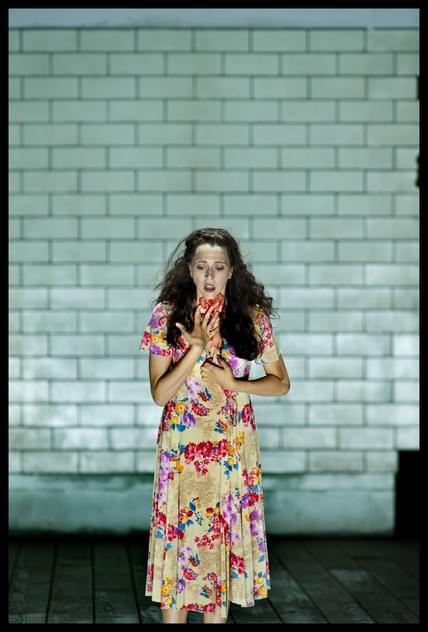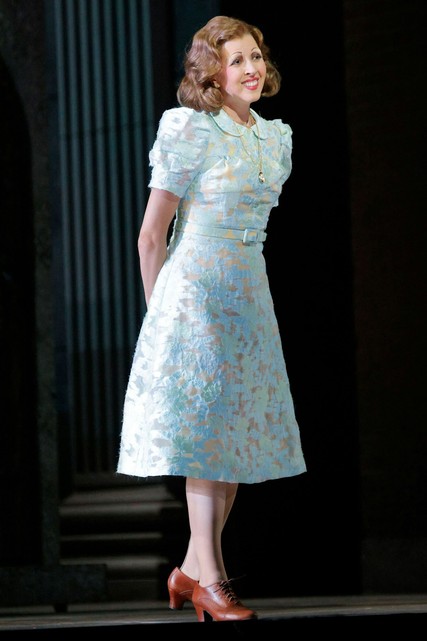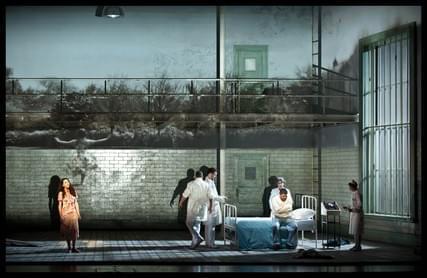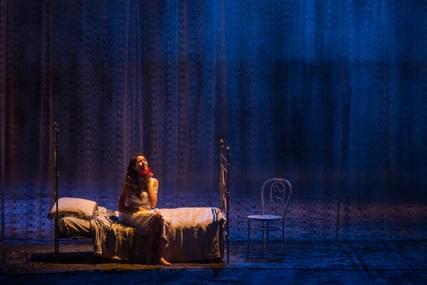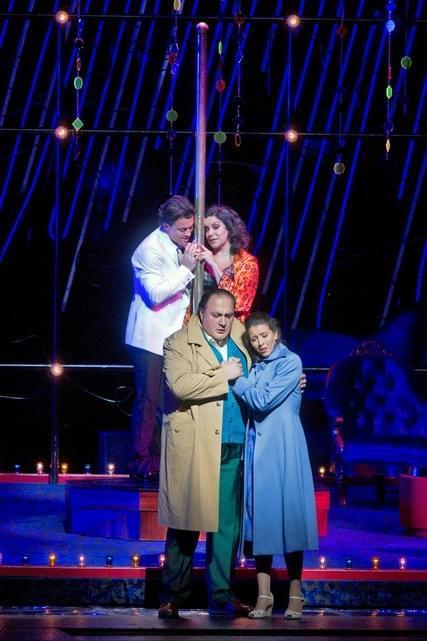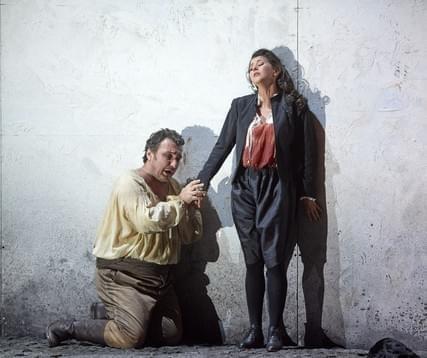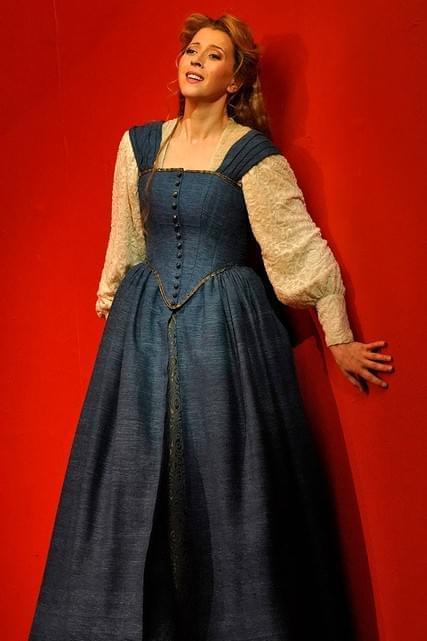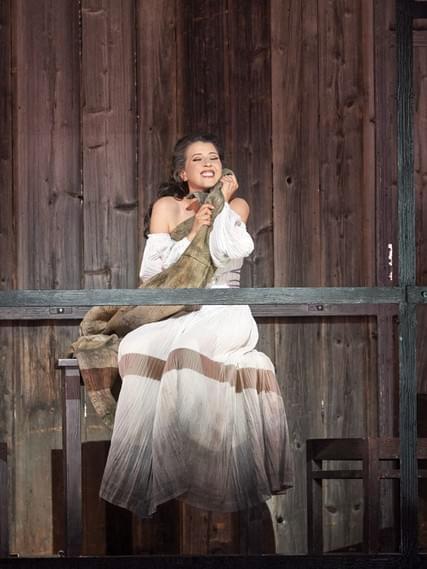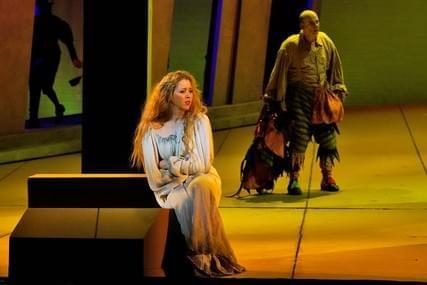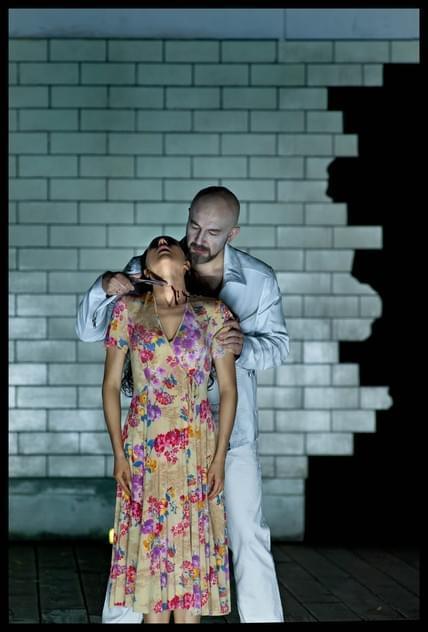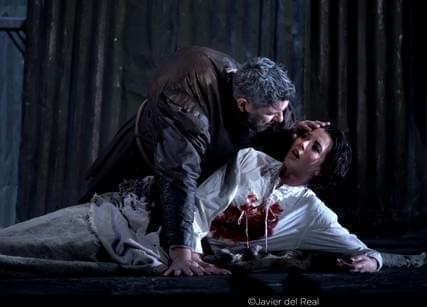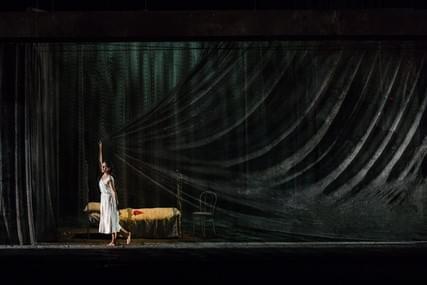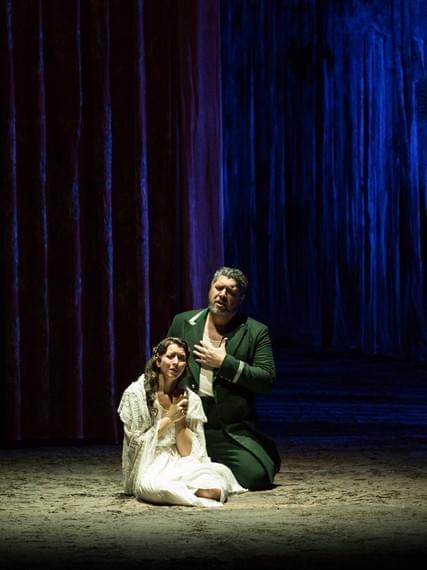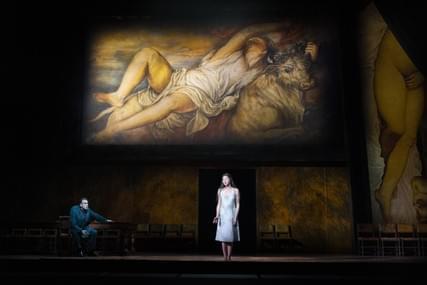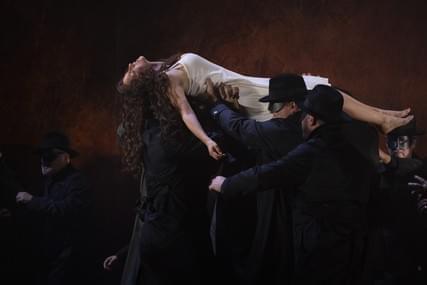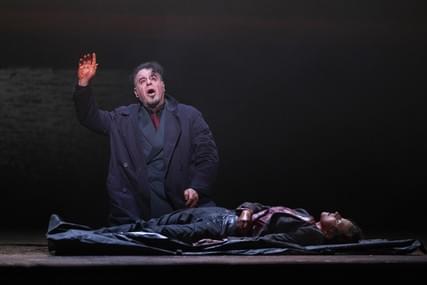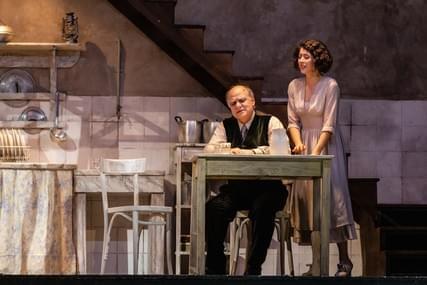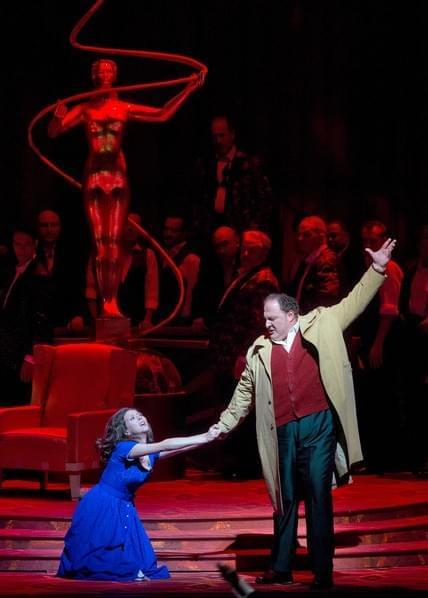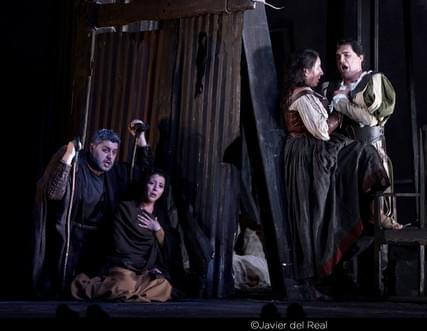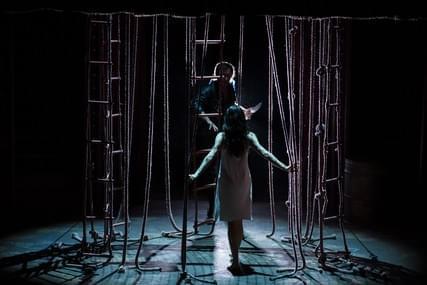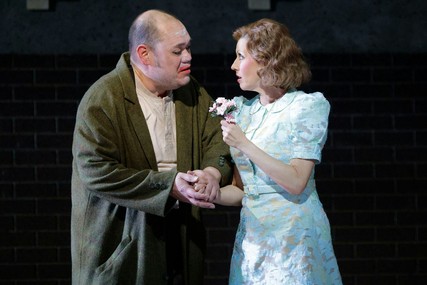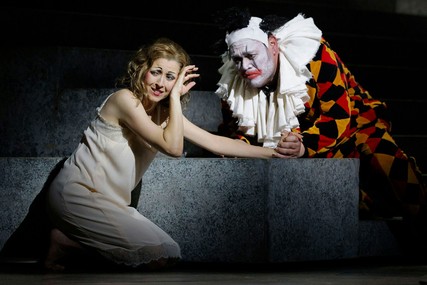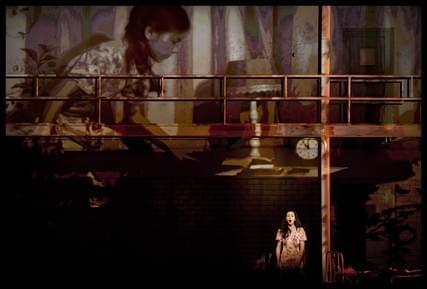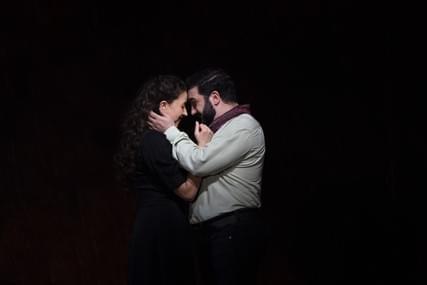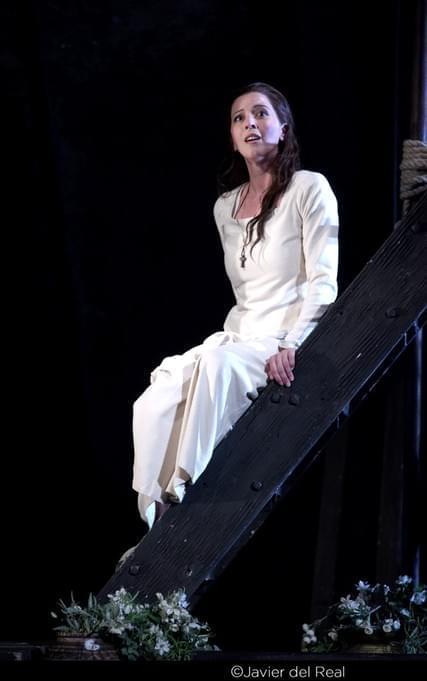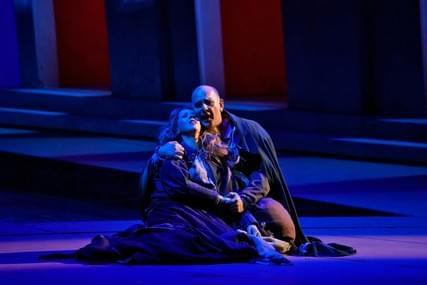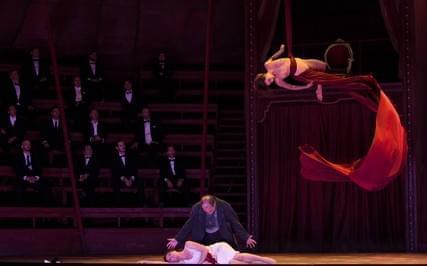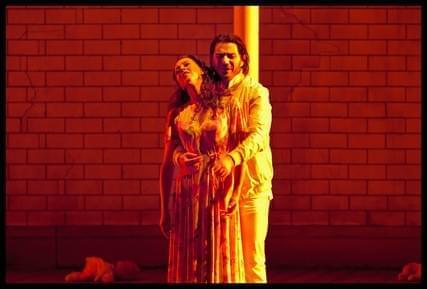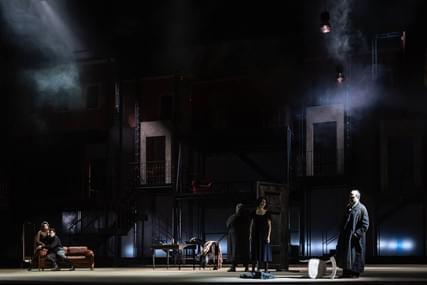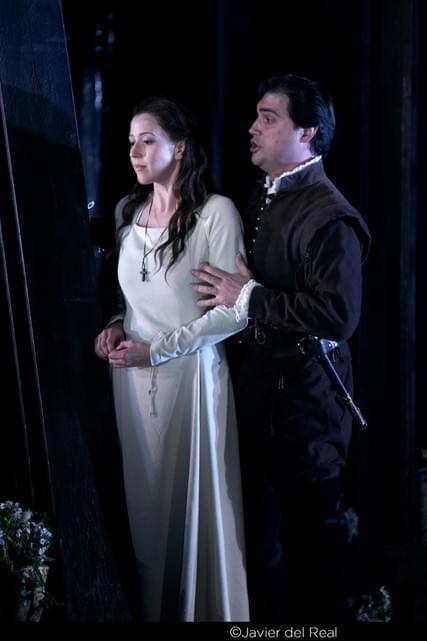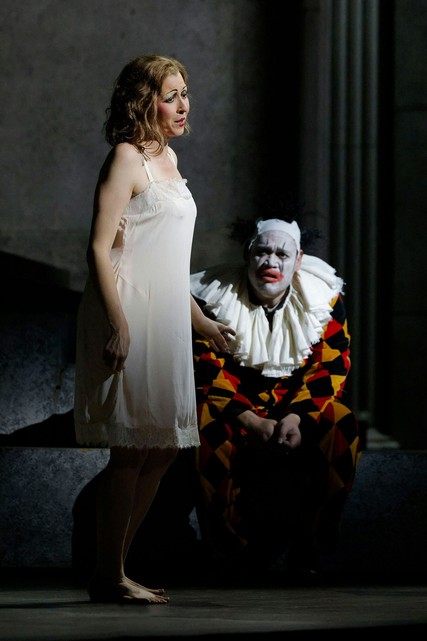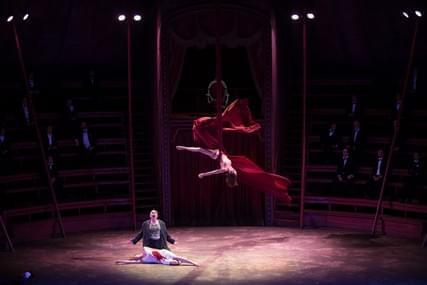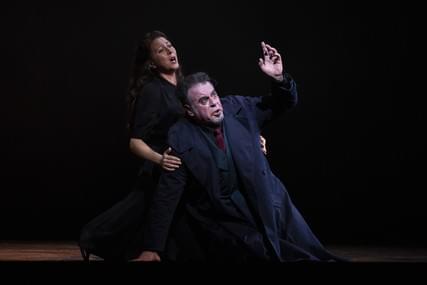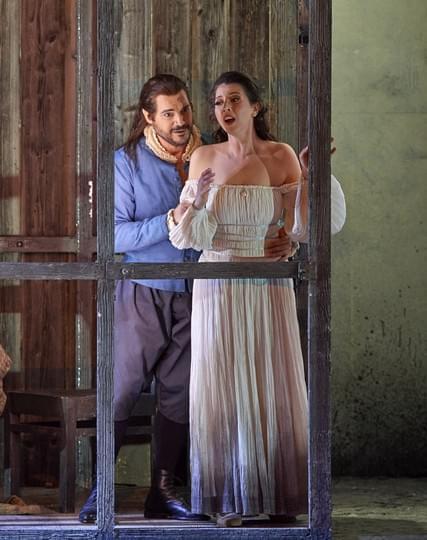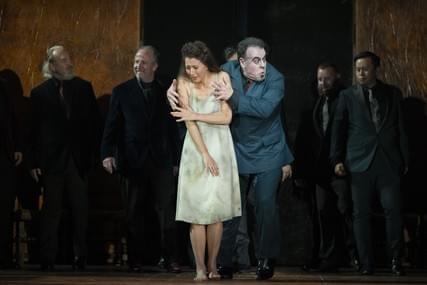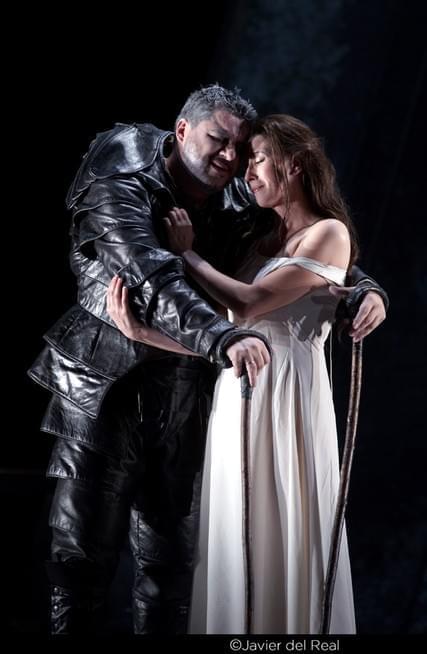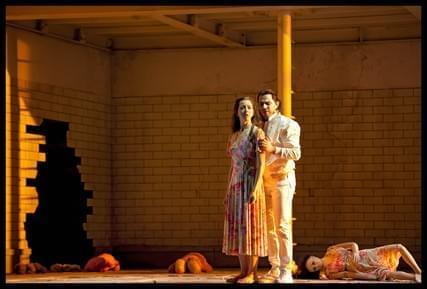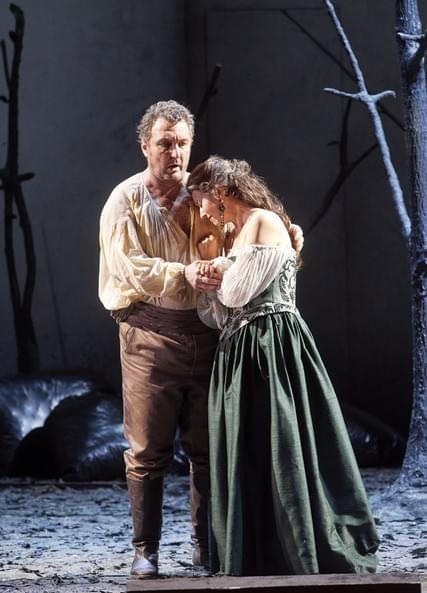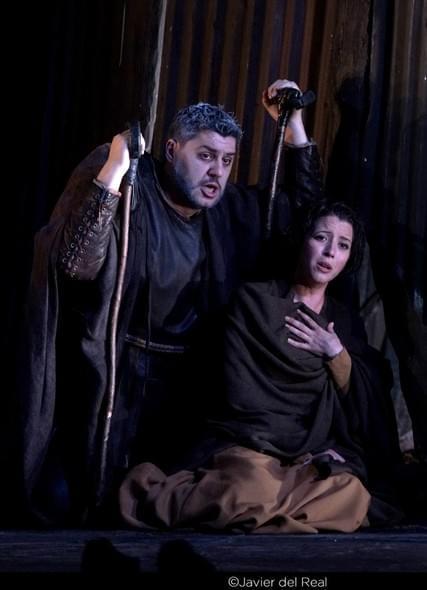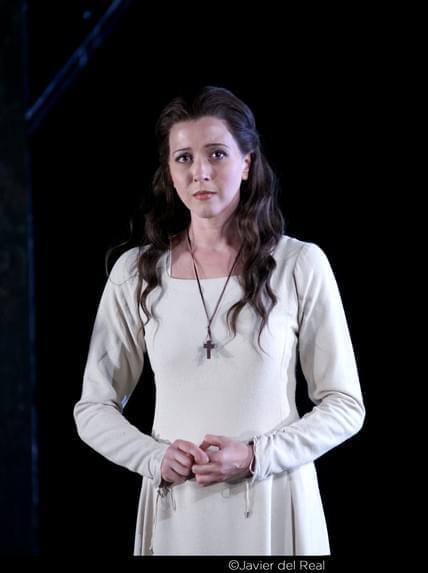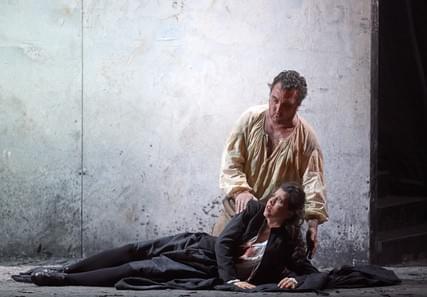Gilda in Rigoletto
Lisette Oropesa's portrayal of Gilda has drawn consistent praise across numerous reviews for her ability to infuse the character with depth and authenticity, setting her interpretation apart from more superficial renditions. Critics frequently highlight her departure from the "doll-like" portrayals by other sopranos, emphasizing her ability to convey a wide emotional range from youthful exuberance to profound self-sacrifice. This emotional versatility is made palpable through her exceptional vocal technique, which includes crystal-clear high notes, agile phrasing, and a remarkable command of dynamics that allows her to express Gilda's fragility and strength with equal conviction.
Oropesa's performances are noted for their technical precision and the emotional resonance she brings to the role. Her "Caro nome" is often singled out as a highlight, described as an invocation that is both fragile and radiant, embodying the character's naive devotion and tragic strength. The reviews also commend her refined stage presence and ability to transform Gilda into a multi-dimensional character. Whether stepping in at the last minute or revisiting the role she has inhabited before, Oropesa's Gilda is marked by an angelic clarity and a sophisticated palette of vocal colors, which allows her to explore the full emotional landscape of the character.
Overall, Lisette Oropesa's interpretation of Gilda is celebrated for its blend of technical excellence and emotional depth, making her portrayal both captivating and memorable. Her continued evolution in the role demonstrates her ability to deepen her understanding and portrayal of Gilda, solidifying her reputation as one of the leading sopranos of her time.
Lisette has been reviewed 82 times in this role.
Role Information
- Composer: Giuseppe Verdi
- Opera: Rigoletto
- Performances: 73
- Reviews: 82
- Venues: 15
- Organizations: 14
- Years: 2008 - 2025
The vocal part was very satisfying, starting with Lisette Oropesa's Gilda, who had already sung the same role here in 2018, and whose presence was a pleasant surprise because she took the place left by Rosa Feola, initially announced in the role. Oropesa moved and delighted with the virtuosic, secure, and crystalline handling of her voice. Every note and every…
The vocal part was very satisfying, starting with Lisette Oropesa's Gilda, who had already sung the same role here in 2018, and whose presence was a pleasant surprise because she took the place left by Rosa Feola, initially announced in the role. Oropesa moved and delighted with the virtuosic, secure, and crystalline handling of her voice. Every note and every phrase made sense in her interpretation, with the variety of colors and the way she reveled in the highest notes of her part.
— Pro Opera, June 2025
Oropesa gets to the heart of Gilda's tragedy - that in protecting her, her father left her open to the first man to pay her any attention. Should he have trusted his intelligent and beautiful daughter to swim with the sharks in the palace? The time had to come, but "Tomorrow" is often the easiest answer for any parent when…
Oropesa gets to the heart of Gilda's tragedy - that in protecting her, her father left her open to the first man to pay her any attention. Should he have trusted his intelligent and beautiful daughter to swim with the sharks in the palace? The time had to come, but "Tomorrow" is often the easiest answer for any parent when a child must be sent out into a hostile and risky world. Oropesa's huge reception at the curtain underlined how emotional was her connection to the audience and how magnificently she sang the role.
— Broadway World, September 2021
Soprano Lisette Oropesa (alternating with Kathryn Lewek) sings Gilda with angelic clarity, capturing the character’s naive devotion and ultimate tragic strength. Her performance evolved from innocence to maturity in a manner that felt authentic and moving. The chemistry between Oropesa and Kelsey added a compelling emotional layer to the production, making Gilda’s fate all the more tragic. Her famous aria…
Soprano Lisette Oropesa (alternating with Kathryn Lewek) sings Gilda with angelic clarity, capturing the character’s naive devotion and ultimate tragic strength. Her performance evolved from innocence to maturity in a manner that felt authentic and moving. The chemistry between Oropesa and Kelsey added a compelling emotional layer to the production, making Gilda’s fate all the more tragic. Her famous aria “Caro nome” was angelic and emotionally resonant, with a purity in tone that was haunting. Her performance sparkled with innocence, making her sacrifice during the lightning and thunderstorm-lashed finale all the more devastating.
— Arts Beat LA, June 2025
There is no doubt where the vocal triumph of the evening lies. This is Lisette’s Oropesa’s first Gilda on a British stage: girlish and unaffected, it is a wonderfully complete piece of singing, her “Caro nome” precise and emotional in every detail.
There is no doubt where the vocal triumph of the evening lies. This is Lisette’s Oropesa’s first Gilda on a British stage: girlish and unaffected, it is a wonderfully complete piece of singing, her “Caro nome” precise and emotional in every detail.
— The Telegraph, September 2021
Lisette Oropesa has all Gilda’s notes at her command and manages the tricky task of conveying her character’s almost terrifying innocence.
Lisette Oropesa has all Gilda’s notes at her command and manages the tricky task of conveying her character’s almost terrifying innocence.
— The Stage, September 2021
t is, however, Lisette Oropesa, with her beautifully toned sound, who stands as the first among equals as she presents a Gilda who is totally overwhelmed by her delusion that the Duke really loves her.
t is, however, Lisette Oropesa, with her beautifully toned sound, who stands as the first among equals as she presents a Gilda who is totally overwhelmed by her delusion that the Duke really loves her.
— Opera Online, September 2021
Having enjoyed Lisette Oropesa in the recent OrphéeI was eager to make my acquaintance with her Gilda and she alone, amongst a talented cast, was the one who consistently spun vocal gold. Her formidable technical prowess constantly brought pleasure and astonishment to the ear. Her breath control and fluency above the staff were magical and her touching, nervous, sincerity in the opening scene…
Having enjoyed Lisette Oropesa in the recent OrphéeI was eager to make my acquaintance with her Gilda and she alone, amongst a talented cast, was the one who consistently spun vocal gold. Her formidable technical prowess constantly brought pleasure and astonishment to the ear. Her breath control and fluency above the staff were magical and her touching, nervous, sincerity in the opening scene laid the foundation for the sacrifice to come in the last.
Her “Caro nome” was a veritable how-to manual on holding an audience enraptured. Her final moments, with her beautiful arching messa di voce lines, were the very definition of what the the Italians call “la bella morte.”
— Parterre, May 2018
Charismatic, though, he isn’t. Lisette Oropesa doesn’t have a huge amount to go on as the silly girl who loves her rapist to the end, but her lyric soprano – fuller than usual in this role – is engaged in a fascinatingly different “Caro nome” from the coloratura.
Charismatic, though, he isn’t. Lisette Oropesa doesn’t have a huge amount to go on as the silly girl who loves her rapist to the end, but her lyric soprano – fuller than usual in this role – is engaged in a fascinatingly different “Caro nome” from the coloratura.
— The Arts Desk, September 2021
Lisette Oropesa is becoming one of the reference points among sopranos; she triumphed in Paris with Les Huguenots, followed by Don Pasquale, and was with Gatti as Nanetta in Amsterdam's Falstaff. One might expect her to have a light voice, but this is not the case. Her voice has a real body, with very controlled and masterful high notes and…
Lisette Oropesa is becoming one of the reference points among sopranos; she triumphed in Paris with Les Huguenots, followed by Don Pasquale, and was with Gatti as Nanetta in Amsterdam's Falstaff. One might expect her to have a light voice, but this is not the case. Her voice has a real body, with very controlled and masterful high notes and upper registers. She is a very fresh, young, but also determined and mature Gilda. She is nothing like a nightingale, especially in the famous "Caro nome" stripped of unnecessary cadenzas and embellishments, on the contrary: the vocal line and passages are impeccable, the diction flawless, with a true sense of color. She knows how to bring out drama, hesitations, and joy alike: the way she rushes towards her father trying to tell him about her budding love (without managing to, by the way) with a juvenile color and in the immediate sincerity of joy, contrasts with a "Caro nome" full of love, but already serious, almost melancholic, which is a masterpiece of restraint and emotion, particularly in the premonitory "e fin l'ultimo mio sospir, caro nome, tuo sarà." She also knows how to bring out dramatic accents marked at the end of the second act. The voice is of rare reliability, with great homogeneity, and her commitment is absolute. A very great Gilda, probably the best today, who knows perfectly how to balance commitment between youth, love, drama, with a great stage and vocal presence: she is heartrending in the final scene ("Ah, ch'io taccia! A me, a lui perdonate.") where, as at the end of Act II, she asks the father for forgiveness ("Perdonate: a noi pure una voce di perdono dal cielo verrà."), once again premonitory, since the staging has her die standing, like the angel she will become in heaven…
— Wanderer, December 2018
Due to Patricia Petibon's illness, Lisette Oropesa graciously stepped in at short notice to take on the role of Gilda, which she portrayed beautifully with her full, luminous, richly-coloured soprano.
Due to Patricia Petibon's illness, Lisette Oropesa graciously stepped in at short notice to take on the role of Gilda, which she portrayed beautifully with her full, luminous, richly-coloured soprano.
— Online Merker, November 2015
she brought a golden honeyed tone, a little reminiscent of Beverly Sills, to Verdi's great coloratura aria "Caro Nome" at the end of the first act and vocally remained the stunning star of the show
she brought a golden honeyed tone, a little reminiscent of Beverly Sills, to Verdi's great coloratura aria "Caro Nome" at the end of the first act and vocally remained the stunning star of the show
— Los Angeles Times, May 2018
But the vocal sensation of the evening was undoubtedly the Gilda of the American soprano Lisette Oropesa. Her lyrical coloratura soprano sounded that evening with such impeccable purity and lived passion that the pampered Covent Garden audience was swept away to true storms of applause. She is perhaps the best Gilda I have ever admired worldwide.
But the vocal sensation of the evening was undoubtedly the Gilda of the American soprano Lisette Oropesa. Her lyrical coloratura soprano sounded that evening with such impeccable purity and lived passion that the pampered Covent Garden audience was swept away to true storms of applause. She is perhaps the best Gilda I have ever admired worldwide.
— Klassik Begeistert, October 2021
We knew of Lisette Oropesa's characters associated with that type of female vocalism known as soubrette. In fact, her baptismal name is the same as that of a perfect example of such a soprano category, that is, the second soprano of La Rondine, a character that is part of her repertoire along with Sophie (the Massenet), Nannetta, or Susanna. But…
We knew of Lisette Oropesa's characters associated with that type of female vocalism known as soubrette. In fact, her baptismal name is the same as that of a perfect example of such a soprano category, that is, the second soprano of La Rondine, a character that is part of her repertoire along with Sophie (the Massenet), Nannetta, or Susanna. But the big surprise was to find a Gilda with sufficient means, with a song where the expression was perfectly accommodated with enough capacity to assure it, transitioning with total ease from duets with the baritone and the tenor to a simply extraordinary Caro nome. Resolving without problems the parts that are later more demanding in the final act II and in the trio of III (we remember here that the strict Toscanini, chose a spinto, Zinka Milanov, for the recording of this act in 1944) and leaving from the scene of her death a memory that is surely indelible, a vocal model for future Gildas.
— El arte de la fuga, December 2015
Lisette Oropesa is a very secure coloratura soprano, a deeply tender Gilda, who draws the cantilenas as if with a silver pencil. In this, the love for her father comes across more credibly than the passion for the Duke to whom Gilda sacrifices her life. She shapes her big aria in the first act finely, as a reserved, lyrical monologue.…
Lisette Oropesa is a very secure coloratura soprano, a deeply tender Gilda, who draws the cantilenas as if with a silver pencil. In this, the love for her father comes across more credibly than the passion for the Duke to whom Gilda sacrifices her life. She shapes her big aria in the first act finely, as a reserved, lyrical monologue. In the dramatic second part, where she lets herself be murdered by the assassin Sparafucile (very convincingly: Sami Luttinen) in place of the Duke, the soprano excites with dramatic tones.
— Online Merker, September 2014
Oropesa was a fantastic Gilda. With a voice as fragile as glass, transparent and strong at the same time, she is an ideal interpreter for this role.
Oropesa was a fantastic Gilda. With a voice as fragile as glass, transparent and strong at the same time, she is an ideal interpreter for this role.
— Place de l'Opera, May 2017
And Lisette Oropesa was a Gilda who invited tenderness. Her pure, smooth soprano and alert presence were both endearing
And Lisette Oropesa was a Gilda who invited tenderness. Her pure, smooth soprano and alert presence were both endearing
— New York Times, April 2013
There was anticipation for the Verona debut of Lisette Oropesa, fresh from her triumphs at the ROF in Pesaro. The American soprano did not disappoint. Her voice, which has a slight vibrato and reminiscent, as rightly noted, of certain tonal inflections of [Angela] Gheorghiu, did not sound frail or light at all and expanded in the amphitheater better than the…
There was anticipation for the Verona debut of Lisette Oropesa, fresh from her triumphs at the ROF in Pesaro. The American soprano did not disappoint. Her voice, which has a slight vibrato and reminiscent, as rightly noted, of certain tonal inflections of [Angela] Gheorghiu, did not sound frail or light at all and expanded in the amphitheater better than the others. The emission was round and fluid throughout the range and only the E flat of the "Yes, revenge!" duet sounded a bit stretched out (a duet that incidentally was encored not exactly by popular demand). Add in her exceptional diction, the accuracy of her phrasing, well-calibrated emphasis, and you get the idea of a very interesting performer.
— Conessi all'Opera, August 2018
The purity of Lisette Oropesa's performance as Gilda literally enchanted the audience.
The purity of Lisette Oropesa's performance as Gilda literally enchanted the audience.
— Il Sussidiario, December 2018
Lisette Oropesa confirms herself as one of the leading sopranos of our time. Excellent technique, very long breaths, trills that are true trills. A palette of colors that allows her to outline all aspects of this seemingly simple and trivial character, which in the past was often seen as a silly little doll. Gilda is not like that, and the…
Lisette Oropesa confirms herself as one of the leading sopranos of our time. Excellent technique, very long breaths, trills that are true trills. A palette of colors that allows her to outline all aspects of this seemingly simple and trivial character, which in the past was often seen as a silly little doll. Gilda is not like that, and the proof of this is that, despite her father providing her with evidence of the Duke's wicked personality and his cynicism, she still decides to sacrifice her life for the man she loves. "Caro nome" performed without the traditional embellishments to underline the more lyrical aspect that Verdi has reserved for this character, but an extremely high B-flat at the end of "Vendetta" where "there was no mercy for anyone." Adorably staged. The character is absolutely credible. I will listen to her again if all goes well in Naples in October 2026 as Alcina. In the end, she asked me, "Could you hear me?" because she did not have the right perception. I reassured her. She has an incredible vocal projection that made a difference in an acoustically challenging venue like the Arena!
— Lirica Oggi, September 2025
The embodiment of Lisette Oropesa stands out, a voice that is light-lyric yet full-bodied, impeccably projected, well-placed, and correctly supported by breath control. Her coloratura skills were evident in a brilliant performance of "Caro nome," culminating in a long, well-executed trill. The high E-flat at the end of the vengeance aria was also superb. It's true that her timbre is…
The embodiment of Lisette Oropesa stands out, a voice that is light-lyric yet full-bodied, impeccably projected, well-placed, and correctly supported by breath control. Her coloratura skills were evident in a brilliant performance of "Caro nome," culminating in a long, well-executed trill. The high E-flat at the end of the vengeance aria was also superb. It's true that her timbre is not particularly beautiful or unique, and some of the sustained notes she produced lacked a bit of firmness and placement, but we are unquestionably facing a soprano who has her act together, with control over her instrument, sound intensity, breathing, and the mechanics of singing. That said, in terms of interpretive aspect, she is not a wonder of expressiveness.
— Codalario, December 2015
Lisette Oropesa is without a doubt the highlight of the cast. She is a never cloying and very credible Guild in communicating fragile curiosity, palpitating and naive love, violated innocence and unconditional sacrifice for the love of the father. Highlights are her "Caro nome" where the trills (which almost become one with her tight and so peculiar vibrato) truly capture…
Lisette Oropesa is without a doubt the highlight of the cast. She is a never cloying and very credible Guild in communicating fragile curiosity, palpitating and naive love, violated innocence and unconditional sacrifice for the love of the father. Highlights are her "Caro nome" where the trills (which almost become one with her tight and so peculiar vibrato) truly capture the beating of Gilda's heart, "Tutte le feste" from the lyrical and vulnerable abandonment and the final duet with Rigoletto “Lassù in cielo”, very moving. One would have expected a much smaller live voice, especially in a large room like Covent Garden, but was pleasantly surprised. Despite some thinning in high notes, the voice is very well projected and perfectly audible in all moments of the ensemble, without ever being covered by the orchestra and colleagues. Oropesa takes care of the legato well and has a taste for phrasing, which is never boring.
— Conessi all'Opera, September 2021
Her '"Caro nome" was exquisite, a perfectly lovely arc of tonal radiance and dynamic nuance, climaxing with an incredible trill. All evening the soprano produced one beautiful phrase after another, with impeccable musicianship and with the character's vulnerability and ultimate resolve finely delineated in both the words and the colours of the voice.
Her '"Caro nome" was exquisite, a perfectly lovely arc of tonal radiance and dynamic nuance, climaxing with an incredible trill. All evening the soprano produced one beautiful phrase after another, with impeccable musicianship and with the character's vulnerability and ultimate resolve finely delineated in both the words and the colours of the voice.
— Oberon's Grove, May 2013
Oropesa’s expressive and beautifully modulated soprano gave full range to Gilda’s every emotion. Her love and regard for her father was palpable from their first duet in Act I to Act II’s ‘Piangi, fanciulla’ to their final tragic duet, ‘Lassu – in cielo’, as Gilda dies in Rigoletto’s arms.
Oropesa’s expressive and beautifully modulated soprano gave full range to Gilda’s every emotion. Her love and regard for her father was palpable from their first duet in Act I to Act II’s ‘Piangi, fanciulla’ to their final tragic duet, ‘Lassu – in cielo’, as Gilda dies in Rigoletto’s arms.
— Seen and Heard International, May 2018
Lisette Oropesa is simply the most believable Gilda I have seen; not the most voluptuous voice, but used to devastatingly expressive effect. Her mixture of fragility and self-sacrifice, transferred from one controlling monster to another, is heart-rending.
Lisette Oropesa is simply the most believable Gilda I have seen; not the most voluptuous voice, but used to devastatingly expressive effect. Her mixture of fragility and self-sacrifice, transferred from one controlling monster to another, is heart-rending.
— The Times UK, September 2021
Lisette Oropesa was a ravishing Gilda, her silvery tones and beautiful high range perfectly suited for the role of the young innocent girl. “Gualtier Malté”, that one and only traditionally-constructed aria of the opera, had unfortunately to be interrupted at first, so as to whisk away a member of the audience who was apparently unwell. When the performance resumed, Ms…
Lisette Oropesa was a ravishing Gilda, her silvery tones and beautiful high range perfectly suited for the role of the young innocent girl. “Gualtier Malté”, that one and only traditionally-constructed aria of the opera, had unfortunately to be interrupted at first, so as to whisk away a member of the audience who was apparently unwell. When the performance resumed, Ms Oropesa sang the aria with elegant phrasing, top notes ringing to the rafters and exquisitely executed trills with which she has deservedly brought down the house.
— Bachtrack, March 2015
Lisetta Oropesa remains one of the leading lyric coloraturas working today. There is richness and oaky color in her lower register – redolent of Callas – which gives the character a power and gravitas that twittering glittering approaches rule out. Her “Caro nome” received a thunderous reception, and most of the passagework and high notes shone – particularly that trill
Lisetta Oropesa remains one of the leading lyric coloraturas working today. There is richness and oaky color in her lower register – redolent of Callas – which gives the character a power and gravitas that twittering glittering approaches rule out. Her “Caro nome” received a thunderous reception, and most of the passagework and high notes shone – particularly that trill
— OperaWire, September 2021
Lisette Oropesa, who stepped in at the last moment in place of Erin Morley in the role of Gilda, enchanted with a clear voice, bright high notes, and a refined stage presence. She reached the peak with the aria "Caro nome," keeping the audience suspended in an almost religious silence, which then exploded into liberating ovations, an unmistakable sign that…
Lisette Oropesa, who stepped in at the last moment in place of Erin Morley in the role of Gilda, enchanted with a clear voice, bright high notes, and a refined stage presence. She reached the peak with the aria "Caro nome," keeping the audience suspended in an almost religious silence, which then exploded into liberating ovations, an unmistakable sign that those steps held an audience aware of who they were listening to.
— Opera Mundus, September 2025
Next to him, Lisette Oropesa's Gilda illuminated the evening with a singing of rare beauty: bright high notes, crystal-clear agility, and a phrasing that made the character's fragility palpable. The audience gave her back an ovation after a textbook "Caro nome" - and not just any, but one of those that make you want to hit "repeat."
Next to him, Lisette Oropesa's Gilda illuminated the evening with a singing of rare beauty: bright high notes, crystal-clear agility, and a phrasing that made the character's fragility palpable. The audience gave her back an ovation after a textbook "Caro nome" - and not just any, but one of those that make you want to hit "repeat."
— MTG Lirica, September 2025
Lisette Oropesa‘s Gilda might shimmer, but there’s density beneath the sheen. She’s not some glittering victim. She’s a girl in freefall. Her big aria “Caro nome” was as delicate as it was driven. Her second act lament broke open like a wound. There’s a Callas-like depth to her lower register that gives Gilda weight and force, even as she makes…
Lisette Oropesa‘s Gilda might shimmer, but there’s density beneath the sheen. She’s not some glittering victim. She’s a girl in freefall. Her big aria “Caro nome” was as delicate as it was driven. Her second act lament broke open like a wound. There’s a Callas-like depth to her lower register that gives Gilda weight and force, even as she makes devastatingly bad decisions. When she shares the stage with Kelsey, the production’s chill lifts. Their scenes together feel like a separate opera, one where human stakes still matter.
— Stage and Cinema, June 2025
The soprano, Lisette Oropesa, gifted with a well-rounded vocal ability and beautiful enamel, paints a fresh and lily-like Gilda, without, however, falling into empty gesticulations or useless languorous attitudes: her character is indeed a young woman in love, but at the same time, resolved and determined. It is pleasing to recall her rendition of "Caro nome", where Oropesa showcases admirable…
The soprano, Lisette Oropesa, gifted with a well-rounded vocal ability and beautiful enamel, paints a fresh and lily-like Gilda, without, however, falling into empty gesticulations or useless languorous attitudes: her character is indeed a young woman in love, but at the same time, resolved and determined. It is pleasing to recall her rendition of "Caro nome", where Oropesa showcases admirable coloratura, a good maintenance of breath, and a high register of adamantine beauty.
— Conessi all'Opera, December 2018
Eerie, as eerie is the resolve that Lisette Oropesa, through impeccable singing and a voice that captures from the start, lends to Gilda: her "Caro nome" (with the original cadenza written by Verdi) is a reflection on love, the "Tutte le feste al tempio" becomes the declaration of freedom of a woman who, even when betrayed, still wants to love…
Eerie, as eerie is the resolve that Lisette Oropesa, through impeccable singing and a voice that captures from the start, lends to Gilda: her "Caro nome" (with the original cadenza written by Verdi) is a reflection on love, the "Tutte le feste al tempio" becomes the declaration of freedom of a woman who, even when betrayed, still wants to love and follow her destiny to the end. Eerie because her heart, in the darkness, crushed by this sorrow rather than wounded by the dagger, will cease to beat.
— Pierachille Dolfini, December 2018
Indeed, she shone as Gilda, showing a beautiful and refined soprano lirico with an adamant high register. She conquered a standing ovation after an immaculate Caro nome,
Indeed, she shone as Gilda, showing a beautiful and refined soprano lirico with an adamant high register. She conquered a standing ovation after an immaculate Caro nome,
— Opera Click, March 2015
As his daughter, Gilda, soprano Lisette Oropesa was touching. Oropesa was playful, flitting around amorously, but then transformed through each of the acts, growing up all too quickly, but believably. “Caro nome” was captivating, sensitively accompanied by James Conlon’s orchestra. The three leads joined forces throughout the evening effectively, Oropesa and Kelsey in the second act were magnificent, Oropesa and Barbera…
As his daughter, Gilda, soprano Lisette Oropesa was touching. Oropesa was playful, flitting around amorously, but then transformed through each of the acts, growing up all too quickly, but believably. “Caro nome” was captivating, sensitively accompanied by James Conlon’s orchestra. The three leads joined forces throughout the evening effectively, Oropesa and Kelsey in the second act were magnificent, Oropesa and Barbera in the first were charming, and capped off their duet with thrilling high notes.
— Bachtrack, June 2025
Lisette Oropesa presents a Gilda that combines a girlish appearance and timbre with a mature artistic allure. Her lightly spiced lyrical soprano, adorned with a beautifully natural vibrato, faces no challenge too great, while simultaneously excelling in lyricism and vocal nuances. The culmination of this is exemplified at the end of 'Caro nome,' crowned with a trill such as I…
Lisette Oropesa presents a Gilda that combines a girlish appearance and timbre with a mature artistic allure. Her lightly spiced lyrical soprano, adorned with a beautifully natural vibrato, faces no challenge too great, while simultaneously excelling in lyricism and vocal nuances. The culmination of this is exemplified at the end of 'Caro nome,' crowned with a trill such as I have not heard in many years.
— Opus Klassiek, May 2017
However, the show was stolen by Rigoletto's daughter Gilda, portrayed by American soprano Lisette Oropesa (last season's Nanetta in Falstaff at The National Opera). Her voice contained both a warm depth and a shining height, and her vocal acrobatics were impressive. Particularly striking was her 'Caro Nome', which initially had to be cut short because someone in the audience fell…
However, the show was stolen by Rigoletto's daughter Gilda, portrayed by American soprano Lisette Oropesa (last season's Nanetta in Falstaff at The National Opera). Her voice contained both a warm depth and a shining height, and her vocal acrobatics were impressive. Particularly striking was her 'Caro Nome', which initially had to be cut short because someone in the audience fell ill. She ended the aria with a beautiful trill that seemed to go on forever.
— Place de l'Opera, March 2015
Oropesa was far removed from the doll-like interpretation of some of her colleagues; in her voice, the entire spectrum from youthful joyous exuberance to self-sacrifice could be heard. A real highlight was the otherwise often mechanical-sounding "Caro nome," infused with the blissful feelings of a first love.
Oropesa was far removed from the doll-like interpretation of some of her colleagues; in her voice, the entire spectrum from youthful joyous exuberance to self-sacrifice could be heard. A real highlight was the otherwise often mechanical-sounding "Caro nome," infused with the blissful feelings of a first love.
— Der Opern Freund, September 2025
Lisette Oropesa gave a luminous, near-transcendent turn as Gilda. Her “Caro nome” was less aria than invocation—fragile, radiant, and utterly devastating.
Lisette Oropesa gave a luminous, near-transcendent turn as Gilda. Her “Caro nome” was less aria than invocation—fragile, radiant, and utterly devastating.
— Indulge Magazine, June 2025
Her bright lyric soprano resulted in a rendition of "Caro nome" that literally stopped the show.
Her bright lyric soprano resulted in a rendition of "Caro nome" that literally stopped the show.
— The Times-Picayune, March 2008
Lisette Oropesa's portrayal of Gilda was also intense, as she was able to express innocence and the purity of virtue with a soft and very pleasing tone, shifting the interpretation more towards the lyrical phrasing rather than virtuosic coloratura, likely following the conductor's indications.
Lisette Oropesa's portrayal of Gilda was also intense, as she was able to express innocence and the purity of virtue with a soft and very pleasing tone, shifting the interpretation more towards the lyrical phrasing rather than virtuosic coloratura, likely following the conductor's indications.
— GB Opera Magazine, December 2018
Her exceptional and charming sense of nuance guarantees her a standing ovation at the end of the night: able to strike the audience with a flaming high note, she elsewhere lightens her singing on a few syllables, whispering an intense and long high note. She completes her first aria (and the audience) with a pure, super high note, the vibrato…
Her exceptional and charming sense of nuance guarantees her a standing ovation at the end of the night: able to strike the audience with a flaming high note, she elsewhere lightens her singing on a few syllables, whispering an intense and long high note. She completes her first aria (and the audience) with a pure, super high note, the vibrato of which gradually widens to change into a trill.
— Olyrix, July 2017
Oropesa communicates both Gilda’s youthful sensuality – as she reclines on her bed, stroking her legs as she dreams of her beloved ‘Gualtier Maldè’, it’s clear that she’s not as innocent as her father thinks – and traumatised disillusionment. Oropesa is simply superb: ‘Caro nome’ was beautifully ornamented and bravely, brilliantly executed. The coloratura soprano absolutely deserved her thunderous ovation.
Oropesa communicates both Gilda’s youthful sensuality – as she reclines on her bed, stroking her legs as she dreams of her beloved ‘Gualtier Maldè’, it’s clear that she’s not as innocent as her father thinks – and traumatised disillusionment. Oropesa is simply superb: ‘Caro nome’ was beautifully ornamented and bravely, brilliantly executed. The coloratura soprano absolutely deserved her thunderous ovation.
— Opera Today, September 2021
Oropesas's soprano did not bestow upon Gilda a cold virtuosity, but wore her heart on her sleeve. Her voice hinted at a gentle melancholy in the softly cushioned middle register, reminiscent of long past opera times. The singer portrayed the character without exaggeration, imbuing her with heartwarming naivety and youthfulness.
Oropesas's soprano did not bestow upon Gilda a cold virtuosity, but wore her heart on her sleeve. Her voice hinted at a gentle melancholy in the softly cushioned middle register, reminiscent of long past opera times. The singer portrayed the character without exaggeration, imbuing her with heartwarming naivety and youthfulness.
— Online Merker, March 2022
The role of Gilda was in the good, tender hands of Lisette Oropesa, an American coloratura soprano with dazzling high notes. Actually, in the best hands: she was the true star of the evening. Her flexible soprano voice and alert stage presence made a big impression, and her "Caro nome" was the best I have ever heard. Otherworldly! Just for…
The role of Gilda was in the good, tender hands of Lisette Oropesa, an American coloratura soprano with dazzling high notes. Actually, in the best hands: she was the true star of the evening. Her flexible soprano voice and alert stage presence made a big impression, and her "Caro nome" was the best I have ever heard. Otherworldly! Just for Lisette Oropesa alone, this *Rigoletto* is worth the visit. A sparkling gem!
— Opera Gazet, May 2017
Oropesa, who starred in L.A. Opera’s “Florencia en el Amazonas” and more recently as the conflicted heroine in Gluck’s “Orpheus and Eurydice,” is the personification of Verdi’s Gilda, the cloistered young girl in love with the idea of love. But it is Oropesa’s singing that raises the role to its zenith, with delicate phrasing and sustained high notes that will…
Oropesa, who starred in L.A. Opera’s “Florencia en el Amazonas” and more recently as the conflicted heroine in Gluck’s “Orpheus and Eurydice,” is the personification of Verdi’s Gilda, the cloistered young girl in love with the idea of love. But it is Oropesa’s singing that raises the role to its zenith, with delicate phrasing and sustained high notes that will break your heart.
— The Press Enterprise, May 2018
Lisette Oropesa portrays a Gilda who is lyrically passionate as well as sung with exquisite finesse, and "Caro nome," concluded with a textbook trill, earns her a true ovation.
Lisette Oropesa portrays a Gilda who is lyrically passionate as well as sung with exquisite finesse, and "Caro nome," concluded with a textbook trill, earns her a true ovation.
— Opera Click, May 2017
Lisette Oropesa was a truly magnificent Gilda. She portrayed her character's girlishness, innocence, and obsessive love. Her voice was clear and bell-like, especially above the staff. Her "Caro Nome" ("Dear name") was most impressive with its radiant, silvery tones and tasteful decoration. Amazingly, she finished the main part of her aria, climbed a long flight of stairs, and immediately began…
Lisette Oropesa was a truly magnificent Gilda. She portrayed her character's girlishness, innocence, and obsessive love. Her voice was clear and bell-like, especially above the staff. Her "Caro Nome" ("Dear name") was most impressive with its radiant, silvery tones and tasteful decoration. Amazingly, she finished the main part of her aria, climbed a long flight of stairs, and immediately began the trill that ends the scene. Twentieth century operagoers told tales of the legendary Erna Berger and her long trills. Twenty-first century patrons may have their own legend-in-the-making with Oropesa. She definitely is a singer to watch.
— Broadway World, May 2018
her portrayal of Gilda has deepened and matured. Oropesa sang an exquisite “Caro nome”, in a rendition at once beautifully studied, delicate and passionate. She can float limpid, affecting high notes and turn accurate, shapely coloratura. Her trills were perfectly formed pearls. Oropesa is also a brave, spirited singer ready to dare, well able to ride the storm trio, to…
her portrayal of Gilda has deepened and matured. Oropesa sang an exquisite “Caro nome”, in a rendition at once beautifully studied, delicate and passionate. She can float limpid, affecting high notes and turn accurate, shapely coloratura. Her trills were perfectly formed pearls. Oropesa is also a brave, spirited singer ready to dare, well able to ride the storm trio, to crown the climax of the quartet, to ring out in “Si, vendetta”. A truly superb Gilda, Oropesa is a singer who lends distinction to all she does.
— Classical Voice, June 2025
Alongside this Rigoletto, the excellent Guild of Lisette Oropesa. With a high school legacy and a beautiful lyric soprano timbre, the Oropesa indulges in high notes exposed as a nice merchandise (for example at the end of the duet with the Duke, who however does not follow her in the high notes, thus seeming almost an intimidated Duke ), but…
Alongside this Rigoletto, the excellent Guild of Lisette Oropesa.With a high school legacy and a beautiful lyric soprano timbre, the Oropesa indulges in high notes exposed as a nice merchandise (for example at the end of the duet with the Duke, who however does not follow her in the high notes, thus seeming almost an intimidated Duke ), but it is not limited to singing.The diction is, also for her, well-kept and almost perfectly understandable in every passage, even in the moments of coloring, the in-depth and communicative phrasing.He catches an applause on the open scene after a notable Caro name, supported by the work of orchestra and conductor, and together with Salsi brings home the ending to be framed.The acting is really convincing: the fall after the stabbing is very credible, and even more the singing and the slow movement of the last scene,
— Opera Click, December 2016
Oropesa's "Caro Nome" was one of, if not the highlight, of the evening
Oropesa's "Caro Nome" was one of, if not the highlight, of the evening
— Latinos Post, April 2013
Lisette Oropesa's voice has that hint of naivety but indestructible in the feminine volitional character, as in the maintenance of intonation and in the roundness of the high register, which, almost without us realizing it, the child-Gilda singing becomes a woman before her time. Not only because she chirps a little less but because the orchestra urges her to understand…
Lisette Oropesa's voice has that hint of naivety but indestructible in the feminine volitional character, as in the maintenance of intonation and in the roundness of the high register, which, almost without us realizing it, the child-Gilda singing becomes a woman before her time. Not only because she chirps a little less but because the orchestra urges her to understand that on Sunday going to mass she might have also thought about her future as a sequestered orphan, not only respectfully (resignedly) filial in an emotional sense. And so, when her song-of-pain dominates the quartet, one can only wonder why it doesn't happen like this all the time.
— Classic Voice, December 2018
The Cuban-American soprano Lisette Oropesa, was a classy Guild, with a very beautiful, balanced and tuned voice.
The Cuban-American soprano Lisette Oropesa, was a classy Guild, with a very beautiful, balanced and tuned voice.
— Il Messaggero, December 2016
Gilda's world, made of pure and youthful love, gives rise to the most moving of scenes. The top of the big top, suddenly studded with a thousand stars, sees Gilda rising from the ground on a trapeze and her romance then taking on extraordinary emotional power. Who better than Lisette Oropesa (Gilda) could have put the weight of the gold…
Gilda's world, made of pure and youthful love, gives rise to the most moving of scenes. The top of the big top, suddenly studded with a thousand stars, sees Gilda rising from the ground on a trapeze and her romance then taking on extraordinary emotional power. Who better than Lisette Oropesa (Gilda) could have put the weight of the gold she possesses in her voice to resonate this sublime cantilena? A moment of grace where the young American soprano offers a voice with subtle nuances. What a beautiful timbre, what a smart interpretation, what heart, what admirable singing. Giving the impression of singing at the limits of her voice, everyone holds their breath for fear she might stumble, that she might be swept away by the emotion of the moment, but beneath these seemingly fragile aspects, one can feel the strength of a singer with perfect technique, and the authenticity of an accomplished artist. It is only in the final measures of her aria that the tension eases and the audience, hitherto quite chilly, erupts in joy and reserves a triumph for this exceptional interpreter.
— ResMusica, September 2014
Oropesa, who starred in L.A. Opera’s Orpheus & Eurydice in March, reveals a more subtly enchanting presence when she discloses her attraction for the Duke in a delicately eerie and movingly sublime version of the love song “Gualtier Maldè! … Caro nome.” Oropesa’s voice trails off with a sighing, spacey exoticism as Gilda revels in her desire for the Duke, in one…
Oropesa, who starred in L.A. Opera’s Orpheus & Eurydice in March, reveals a more subtly enchanting presence when she discloses her attraction for the Duke in a delicately eerie and movingly sublime version of the love song “Gualtier Maldè! … Caro nome.” Oropesa’s voice trails off with a sighing, spacey exoticism as Gilda revels in her desire for the Duke, in one of the opera’s most memorable scenes.
— LA Weekly, May 2018
Oropesa makes a matchless Gilda, singing with an extraordinary beauty of tone and understated depth of feeling: this really is one of the truly great performances.
Oropesa makes a matchless Gilda, singing with an extraordinary beauty of tone and understated depth of feeling: this really is one of the truly great performances.
— The Guardian, September 2021
Lisette Oropesa as Gilda was simply glorious, perhaps the finest coloratura soprano in the world today.
Lisette Oropesa as Gilda was simply glorious, perhaps the finest coloratura soprano in the world today.
— The Article, September 2021
Cuban-American soprano Lisette Oropesa’s Gilda has a fullness of tone which simply grows in beauty as she duets with the Duke, then launches into her ecstatic reverie, ‘Caro nome’.
Cuban-American soprano Lisette Oropesa’s Gilda has a fullness of tone which simply grows in beauty as she duets with the Duke, then launches into her ecstatic reverie, ‘Caro nome’.
— iNews, September 2021
The vibrato of the American Lisette Oropesa ensures that her light soprano voice is always filled with notable liveliness; her highly developed vocal technique, grace in delivery, and precision in her runs make her a perfect interpreter of the character of Gilda: "Caro nome che il mio cor" is the most successful piece of the performance, especially due to the…
The vibrato of the American Lisette Oropesa ensures that her light soprano voice is always filled with notable liveliness; her highly developed vocal technique, grace in delivery, and precision in her runs make her a perfect interpreter of the character of Gilda: "Caro nome che il mio cor" is the most successful piece of the performance, especially due to the emission of pure, pearlescent trills, but one must also mention the opening of "Tutte le feste al tempio", a masterpiece of emission control and half voice. The only flaw in Oropesa's performance is a slight mismatch in timbre between the transition notes and the high register, whose color is a bit more faded compared to the rest; but it is a minor detail, and indeed the audience acclaims her at the end of each scene.
— GB Opera Magazine, December 2015
Lisette Oropesa's star shines bright, the true victor of the evening, at her debut in the Arena. An angelic voice that resonates perfectly in the theater, always with softness and a touching expressiveness of delicacy and sincerity. We hope to be able to hear her again soon here... perhaps as Violetta in 2019.
Lisette Oropesa's star shines bright, the true victor of the evening, at her debut in the Arena. An angelic voice that resonates perfectly in the theater, always with softness and a touching expressiveness of delicacy and sincerity. We hope to be able to hear her again soon here... perhaps as Violetta in 2019.
— Ieri Oggi Domaini Opera, August 2018
The American soprano Lisette Oropesa was a sweet, lovestruck but determined Gilda (just the cadenza of Caro Nome was not absolutely perfect, but it was a tiny spot on a white tablecloth).
The American soprano Lisette Oropesa was a sweet, lovestruck but determined Gilda (just the cadenza of Caro Nome was not absolutely perfect, but it was a tiny spot on a white tablecloth).
— Cultura Mente, December 2018
As Gilda, the American soprano Lisette Oropesa, one of today’s star coloraturas, is the most vocally convincing of the central trio with her needlepoint accuracy and penetrating high notes, easily riding the orchestral tumult of the climactic Storm trio.
As Gilda, the American soprano Lisette Oropesa, one of today’s star coloraturas, is the most vocally convincing of the central trio with her needlepoint accuracy and penetrating high notes, easily riding the orchestral tumult of the climactic Storm trio.
— The Sunday Times, September 2021
...and Lisette Oropesa's Gilda. Delicately portraying Rigoletto's daughter, this Cuban-American soprano earned several "Bravas" for a perfect and deeply moving performance, which alone would be worth the entire production.
...and Lisette Oropesa's Gilda. Delicately portraying Rigoletto's daughter, this Cuban-American soprano earned several "Bravas" for a perfect and deeply moving performance, which alone would be worth the entire production.
— Notodo, December 2015
Slender and graceful, soprano Lisette Oropesa was simply world-class as Gilda, with flawless emission and generous top notes, crystalline up to high E. The long trill at the end of “Caro nome” would have traced a perfect zigzag on a pitch visualiser. Even more stunning than her bravura was the melting glow at the centre of her voice, her morbidezza…
Slender and graceful, soprano Lisette Oropesa was simply world-class as Gilda, with flawless emission and generous top notes, crystalline up to high E. The long trill at the end of “Caro nome” would have traced a perfect zigzag on a pitch visualiser. Even more stunning than her bravura was the melting glow at the centre of her voice, her morbidezza (softness).
— Bachtrack, May 2017
Still, as Gilda, Lisette Oropesa offered a pearly “Caro nome” in her poised soprano
Still, as Gilda, Lisette Oropesa offered a pearly “Caro nome” in her poised soprano
— New York Post, April 2013
The standout, however, was Lisette Oropesa’s Gilda. The American soprano is a superb coloratura with ringing top notes. She displayed a strong sense of line which she used to convey all the sides of her character. Her evolution from an innocent young girl to a resolute woman was credible and moving. She brought the house down and deserved every second…
The standout, however, was Lisette Oropesa’s Gilda. The American soprano is a superb coloratura with ringing top notes. She displayed a strong sense of line which she used to convey all the sides of her character. Her evolution from an innocent young girl to a resolute woman was credible and moving. She brought the house down and deserved every second of it.
— Seen and Heard International, September 2014
Gilda is the American soprano Lisetta Oropesa, coming off a recent success as Adina at the Rossini Opera Festival, who amazes with her flexibility in modulation and the cleanliness of her phrasing.
Gilda is the American soprano Lisetta Oropesa, coming off a recent success as Adina at the Rossini Opera Festival, who amazes with her flexibility in modulation and the cleanliness of her phrasing.
— Le Salon Musicale, August 2018
And her vocalism was ravishing. Strong emotional currents run thru everything Lisette sings; she can find just the right colour for every note and word, and it all seems perfectly spontaneous. A magical, palpable hush settled over the House during Lisette's "Caro nome": an exquisite portrait of a young girl on the brink, the innocence of the words underscored by…
And her vocalism was ravishing. Strong emotional currents run thru everything Lisette sings; she can find just the right colour for every note and word, and it all seems perfectly spontaneous. A magical, palpable hush settled over the House during Lisette's "Caro nome": an exquisite portrait of a young girl on the brink, the innocence of the words underscored by a subtle sense of longing. In the ensuing scenes, phrase after phrase of captivating tone and nuance - from her defiance in the vendetta duet to the heart-wrenching poignancy of her farewell to her father - showed again what a thoughtful and unique artist this soprano is.
— Oberon's Grove, December 2022
The duo Rigoletto-Gilda, respectively the baritone Luca Salsi and the soprano Lisette Oropesa, left a more significant impression, both being extremely convincing in these roles, voices of Verdi excellence, well blended in the duet "Si, vendetta...", rightfully encored.
The duo Rigoletto-Gilda, respectively the baritone Luca Salsi and the soprano Lisette Oropesa, left a more significant impression, both being extremely convincing in these roles, voices of Verdi excellence, well blended in the duet "Si, vendetta...", rightfully encored.
— Opera Magazine, August 2018
Both Álvarez and Oropesa are great actors. Oropesa also happens to be the finest lyric coloratura in the world today. Her soprano is quite dark lower down – hers is no tweetie-pie Gilda – and “Caro nome” revealed rock solid technique including an excellent trill. She narrowed her voice daringly fine at the top, but just within the bounds of…
Both Álvarez and Oropesa are great actors. Oropesa also happens to be the finest lyric coloratura in the world today. Her soprano is quite dark lower down – hers is no tweetie-pie Gilda – and “Caro nome” revealed rock solid technique including an excellent trill. She narrowed her voice daringly fine at the top, but just within the bounds of control.
— Bachtrack, September 2021
Oropesa also has, perhaps more noticably for some, a pure light lyric soprano that is as balanced and classically expressive as recent decades have seen.
Oropesa also has, perhaps more noticably for some, a pure light lyric soprano that is as balanced and classically expressive as recent decades have seen.
— An Unamplified Voice, April 2013
A great surprise caught us when we found out, just a few days before the performance, about the arrival, in the city of Verona, of the renowned soprano Lisette Oropesa. One remains impressed, even on this occasion, by the musicality and flexibility of a vocal range always supervised and guided by a technical mastery of excellent precision. The fullness of…
A great surprise caught us when we found out, just a few days before the performance, about the arrival, in the city of Verona, of the renowned soprano Lisette Oropesa. One remains impressed, even on this occasion, by the musicality and flexibility of a vocal range always supervised and guided by a technical mastery of excellent precision. The fullness of the sound centers is followed by an upper register that is articulated through layers of sound of crystalline purity.
— Opera Libera, September 2025
Lisette Oropesa... is worth her weight in gold. The American soprano of Cuban origin is a fresh and innocent Gilda, just as the character should be, her voice is perfectly suited to the role, her coloratura is agile and precise, as is appreciated well in "Caro nome" and "Tutte le feste al tempio."
Lisette Oropesa... is worth her weight in gold. The American soprano of Cuban origin is a fresh and innocent Gilda, just as the character should be, her voice is perfectly suited to the role, her coloratura is agile and precise, as is appreciated well in "Caro nome" and "Tutte le feste al tempio."
— L'ascoltatore dilettante, December 2018
In her celebrated aria Caro nome, Lisette Oropesa succeeds in showing us both the virtuous flower and, with a flash of bare legs and an innocent roll on her bed, the sensual attraction she feels for the duplicitous duke. The extravagant ornamentation of the aria is delivered superbly, complete with real trill, yet with delicacy and subtlety.
In her celebrated aria Caro nome, Lisette Oropesa succeeds in showing us both the virtuous flower and, with a flash of bare legs and an innocent roll on her bed, the sensual attraction she feels for the duplicitous duke. The extravagant ornamentation of the aria is delivered superbly, complete with real trill, yet with delicacy and subtlety.
— Evening Standard, September 2021
At this point, if Rigoletto ceases to be a gym where athletic prowess and vocal "pipes" are measured, singers must be evaluated for how much and how they contribute to such a revolutionary interpretative project. In this sense, Lisette Oropesa's Gilda is perfect, who not only always sings superbly, but manages to transform "Caro nome" from a great diva’s aria…
At this point, if Rigoletto ceases to be a gym where athletic prowess and vocal "pipes" are measured, singers must be evaluated for how much and how they contribute to such a revolutionary interpretative project. In this sense, Lisette Oropesa's Gilda is perfect, who not only always sings superbly, but manages to transform "Caro nome" from a great diva’s aria into a beautiful, touching soliloquy of a girl in love.
— La Stampa, December 2018
American soprano Lisette Oropesa gave the finest singing of the evening as Gilda, a hopeless romantic-turned-hero who gave her life for her unfaithful lover. Splendid in her lyrical outpourings in duets with the Duke and Rigoletto, Ms. Oropesa had plenty of vocal glamour that could turn from silver into steel at the drop of a hat. Ms. Oropesa’s singing offered…
American soprano Lisette Oropesa gave the finest singing of the evening as Gilda, a hopeless romantic-turned-hero who gave her life for her unfaithful lover. Splendid in her lyrical outpourings in duets with the Duke and Rigoletto, Ms. Oropesa had plenty of vocal glamour that could turn from silver into steel at the drop of a hat. Ms. Oropesa’s singing offered an object lesson in the fine art of bel canto. “Caro nome” featured some meltingly beautiful lines and and perfectly-turned trills, and those ravishing pianissimo high notes in the final duet were to die for, literally.
— Classical Voice, May 2018
Such a dream team also graces the stage, with baritone Luca Salsi as Rigoletto and Lisette Oropesa as Gilda. Oropesa delivered her aria 'Caro nome' with a sweet-voiced and silvery soft timbre at the premiere: it became a musical highlight where textual expression and musical virtuosity naturally merged.
Such a dream team also graces the stage, with baritone Luca Salsi as Rigoletto and Lisette Oropesa as Gilda. Oropesa delivered her aria 'Caro nome' with a sweet-voiced and silvery soft timbre at the premiere: it became a musical highlight where textual expression and musical virtuosity naturally merged.
— TheaterKrant, May 2017
Lisette Oropesa gave Gilda everything: she was warm voiced with her father, later steely determined, and ultimately fragile as she implores Him in Heaven for guidance, showing us the real Gilda.
Lisette Oropesa gave Gilda everything: she was warm voiced with her father, later steely determined, and ultimately fragile as she implores Him in Heaven for guidance, showing us the real Gilda.
— Classical Source, September 2021
Let’s start from the one absolute stellar contribution: that of Lisette Oropesa. After she cancelled singing Elvira (I puritani) in Gstaad recently, one did wonder if she would (a) show and (b) be at her best. Show she did, and this was the best Gilda I, for one, have heard. Her voice is beautifully pure and agile yet has a…
Let’s start from the one absolute stellar contribution: that of Lisette Oropesa. After she cancelled singing Elvira (I puritani) in Gstaad recently, one did wonder if she would (a) show and (b) be at her best. Show she did, and this was the best Gilda I, for one, have heard. Her voice is beautifully pure and agile yet has a fullness that carries right to the back of the theatre. Her ‘Caro nome’ was a showstopper; she has an innocence, and yet we feel that underneath that is a knowing which is powerful.
— Seen and Heard International, September 2021
It is next to impossible to imagine a more affecting Gilda than Oropesa. The stylishness, sweetness, tenderness, flexibility and expressivity of her singing is breathtaking
It is next to impossible to imagine a more affecting Gilda than Oropesa. The stylishness, sweetness, tenderness, flexibility and expressivity of her singing is breathtaking
— The Times Literary Supplement, September 2021
Lisette Oropesa was a compelling Gilda, with beautiful coloratura and purity of tone.
Lisette Oropesa was a compelling Gilda, with beautiful coloratura and purity of tone.
— Opera Lively, May 2013
Oropesa navigated the transition from innocence to maturity both in her stage presence and voice, moving from lyric coloratura to dramatic soprano which distinguishes her altered state.
Oropesa navigated the transition from innocence to maturity both in her stage presence and voice, moving from lyric coloratura to dramatic soprano which distinguishes her altered state.
— Seen and Heard International, June 2025
In the role of Gilda, superstar Lisette Oropesa (stepping in for the unwell Erin Morley), also a veteran of the role with which she made her debut on stage in 2018. The American soprano delivers a classical yet no less intense interpretation, showcasing all of her vocal abilities to delight the audience: the sudden pianissimos, brilliant high notes, and notably…
In the role of Gilda, superstar Lisette Oropesa (stepping in for the unwell Erin Morley), also a veteran of the role with which she made her debut on stage in 2018. The American soprano delivers a classical yet no less intense interpretation, showcasing all of her vocal abilities to delight the audience: the sudden pianissimos, brilliant high notes, and notably skillful management of the lower register ‒ characterized by a sophisticated vibrato that seems to emphasize it almost in a dramaturgical sense ‒ guarantee the singer a well-deserved success.
— Giornale della Musica, September 2025
But the moment of absolute grace is nestled under the stars of a dream sky. When Gilda appears as a lunar trapeze artist above her father's caravan. Lisette Oropesa offers here an example of airy singing, in a magnificent vocal register, with flexible nuances, fine musicality, and thrilling humanity. A pinnacle of the genre.
But the moment of absolute grace is nestled under the stars of a dream sky. When Gilda appears as a lunar trapeze artist above her father's caravan. Lisette Oropesa offers here an example of airy singing, in a magnificent vocal register, with flexible nuances, fine musicality, and thrilling humanity. A pinnacle of the genre.
— Le Temps, September 2014
Famous Interpreters
The role of Gilda in Giuseppe Verdi's "Rigoletto" was first brought to life by the Italian soprano Teresa Brambilla at the opera's premiere on March 11, 1851, at the Teatro La Fenice in Venice. Brambilla's creation of Gilda was marked by her ability to infuse the character with both innocence and deep emotional complexity, setting a high standard for future interpretations. Born into a musical family, Teresa Brambilla was part of a renowned singing dynasty that included her sisters and nieces, all accomplished singers. Her vocal prowess and ability to convey vulnerability and purity made her an ideal choice for Gilda, a role that requires both technical precision and emotional depth. Beyond "Rigoletto," Brambilla was celebrated for her roles in operas by composers such as Donizetti and Bellini, bringing a bel canto finesse that helped establish the dramatic and vocal interpretation necessary for Verdi's demanding score.
Among the legendary interpreters who followed Brambilla, Maria Callas stands out for her contributions during the mid-20th century. Active primarily in the 1950s and 60s, Callas brought a unique dramatic intensity and vocal color to the role of Gilda, famously recorded in her 1955 EMI recording with conductor Tullio Serafin. Her interpretation was noted for its dramatic realism and emotional commitment, qualities that she infused into Gilda's innocent yet tragic arc. Another notable interpreter, Joan Sutherland, active from the 1950s through the 1980s, brought her exceptional vocal technique and crystalline timbre to the role, emphasizing Gilda's purity and vocal agility. Sutherland's 1961 recording under the baton of Nino Sanzogno showcases her ability to blend technical mastery with emotional expression. Renée Fleming, a more contemporary interpreter who rose to prominence in the late 20th century, offered a luxurious vocal warmth and nuanced understanding of the character's emotional journey. Fleming's interpretations have been praised for their lyrical beauty and expressive depth, as captured in her acclaimed live performances and recordings. Each of these sopranos, through their distinctive interpretations, has contributed to the evolving tradition of performing Gilda, expanding on the foundation laid by Teresa Brambilla and redefining the emotional and vocal possibilities of this iconic role.
About the Composer
Giuseppe Verdi, one of the most celebrated composers of the 19th century, is renowned for his masterful operas that blend stirring melodies with profound emotional depth. Born in 1813 in Italy, Verdi's style evolved from the bel canto tradition, characterized by beautiful, expressive vocal lines, to a more dramatic and integrated approach. He composed "Rigoletto" in 1851, a pivotal work in his career, at a time when he sought to challenge the conventions of Italian opera. Inspired by Victor Hugo's controversial play "Le roi s'amuse," Verdi and his librettist, Francesco Maria Piave, crafted a gripping tale of power, betrayal, and vengeance centered around Rigoletto, a hunchbacked court jester. The opera is significant for its deep character exploration, particularly through its complex protagonist, and its innovative use of musical motifs to enhance the narrative. Verdi's approach to vocal writing in "Rigoletto" is particularly noteworthy; his arias and ensembles are meticulously tailored to reflect the psychological nuances of the characters, making the opera a timeless masterpiece that continues to captivate audiences worldwide.
Performance Photos
- Dec. 1, 2018Yasuko Kageyama / TOR
- Dec. 15, 2015Javier del Real
- March 14, 2015Steven Harris
- Dec. 1, 2016Yasuko Kageyama / TOR
- March 26, 2022(c) Wiener Staatsoper / Michael Pöhn
- Dec. 1, 2018Yasuko Kageyama / TOR
- March 26, 2022(c) Wiener Staatsoper / Michael Pöhn
- Dec. 1, 2016Yasuko Kageyama / TOR
- March 26, 2022(c) Wiener Staatsoper / Michael Pöhn
- Sept. 13, 2021Ellie Kurttz - © ROH
- March 26, 2022(c) Wiener Staatsoper / Michael Pöhn
- Dec. 15, 2015Javier del Real
- March 14, 2015Steven Harris
- Dec. 1, 2016Yasuko Kageyama / TOR
- Dec. 1, 2018Yasuko Kageyama / TOR
- Dec. 1, 2016Yasuko Kageyama / TOR
- March 26, 2022(c) Wiener Staatsoper / Michael Pöhn
- Sept. 13, 2021Ellie Kurttz - © ROH
- March 26, 2022(c) Wiener Staatsoper / Michael Pöhn
- Dec. 1, 2016Yasuko Kageyama / TOR
- Sept. 13, 2021Ellie Kurttz - © ROH
- Sept. 13, 2021Ellie Kurttz - © ROH
- Dec. 1, 2018Yasuko Kageyama / TOR
- Dec. 15, 2015Javier del Real
- Dec. 15, 2015Javier del Real
- March 26, 2022(c) Wiener Staatsoper / Michael Pöhn
- Sept. 13, 2021Ellie Kurttz - © ROH
- Dec. 15, 2015Javier del Real
- Dec. 1, 2016Yasuko Kageyama / TOR
- Dec. 1, 2018Yasuko Kageyama / TOR
- Dec. 15, 2015Javier del Real
- Dec. 1, 2018Yasuko Kageyama / TOR
- Sept. 13, 2021Ellie Kurttz - © ROH
- March 26, 2022(c) Wiener Staatsoper / Michael Pöhn
- Dec. 15, 2015Javier del Real
- Sept. 13, 2021Ellie Kurttz - © ROH
- Dec. 15, 2015Javier del Real
- March 26, 2022(c) Wiener Staatsoper / Michael Pöhn
- Dec. 15, 2015Javier del Real
- Dec. 15, 2015Javier del Real
- Dec. 1, 2018Yasuko Kageyama / TOR
- Dec. 15, 2015Javier del Real
- March 26, 2022(c) Wiener Staatsoper / Michael Pöhn
- Dec. 15, 2015Javier del Real
Performance History
Lisette has performed Gilda 73 times.
2025
Arena di Verona
LA Opera2022
Metropolitan Opera
Wiener Staatsoper2021
Royal Opera House2018
Teatro dell'Opera di Roma
Arena di Verona
LA Opera2017
Opéra National de Paris
De Nationale Opera2016
Teatro dell'Opera di Roma2015
Teatro Real
Bayerische Staatsoper
Het Concertgebouw2014
Grand Théâtre de Genève2013
Metropolitan Opera2008
Arizona Opera
New Orleans Opera

